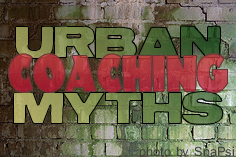
If you're reading this article then, obviously, you spend time online reading about coaching.
And if that's the case, then you must have noticed all those ads that promise that you'll be a master certified coach in two days or 16 hours, or whatever. Sometimes, they also advertise their tuition, which is cheap, cheap, cheap.
You can imagine how those schools are regarded by real professional coaches. Mark Joyella (@CoachReporter), who writes for the Coaching Commons, tweeted about them (I'm paraphrasing), 'Sure and next weekend you can become a brain surgeon!'
I'm thinking those ads mainly appeal three types of people. Those who:
1. Think they already know how to coach (a.k.a. arrogant)
2. Are only interested in coaching for the money (a.k.a. greedy)
3. Are clueless (a.k.a. gullible)
Those who're attracted to us don't fit those descriptions, so I never considered weekend coach training schools our competition.
But I reconsidered that when I heard that one of my most respected competitors, Barbra Sundquist, is closing her 'Become a Certified Coach' school at the end of this year [12-11-09 Update: Barbra isn't going out of business, but simply closing the doors of this particular program. See Barbra's comments in the comments section, below.]. Barbra cited a number of reasons, including rising competition from cheap, highly advertised, schools. That got me thinking...
What if the proliferation of bogus coach training schools drives out most or all of the legitimate schools? Where does that leave the profession of coaching? Will the majority of coaches then be unskilled or disreputable? Will the reputation of coaching drop to the point that real professional coaches quit?
I'm not trying to be an alarmist here. You can't prevent a potential problem if you're not willing to look at it. Coaching has enjoyed incredible freedom in the past 20 years. But the success and freedom of coaching has sometimes attracted people with the wrong motivations.
I admit, 2009 has been a challenging year for School of Coaching Mastery, as well. Several of our students didn't pay their bills. But that forced me to consider just how committed I am to coach training and I realized that if it came down to choosing between my home or my school, I'd give up the house!
So I'm in it for the long haul. But what about you? If you're committed to coaching, then you're probably just as disturbed as I am about the proliferation of schools and coaches who don't cast a good light on this profession.
What do you think needs to be done about it? Do coaching organizations like the IAC and ICF have a responsibility to do anything? Do they even have the authority to do anything? Or do coaches themselves need to take more responsibility for the image of the profession?
There's lots of hang-wringing going on in private forums, but coaching is about action. Do you need to take action?
Please post your views on this in the area below and if coaching is a really important issue for you, please also share this article with the social sharing tools, above.






 You'll never find success wandering down blind alleys.
You'll never find success wandering down blind alleys. Get a flashlight: Take Coach 100 courses to learn a lot more about what it really takes to build a successful coaching business.
Get a flashlight: Take Coach 100 courses to learn a lot more about what it really takes to build a successful coaching business. Many people find it really hard say "no". And, as you probably know, some people are harder to say "no" to than others. But not saying "no" when you need to can absolutely ruin your life, so it's important to learn to do it right.
Many people find it really hard say "no". And, as you probably know, some people are harder to say "no" to than others. But not saying "no" when you need to can absolutely ruin your life, so it's important to learn to do it right.






